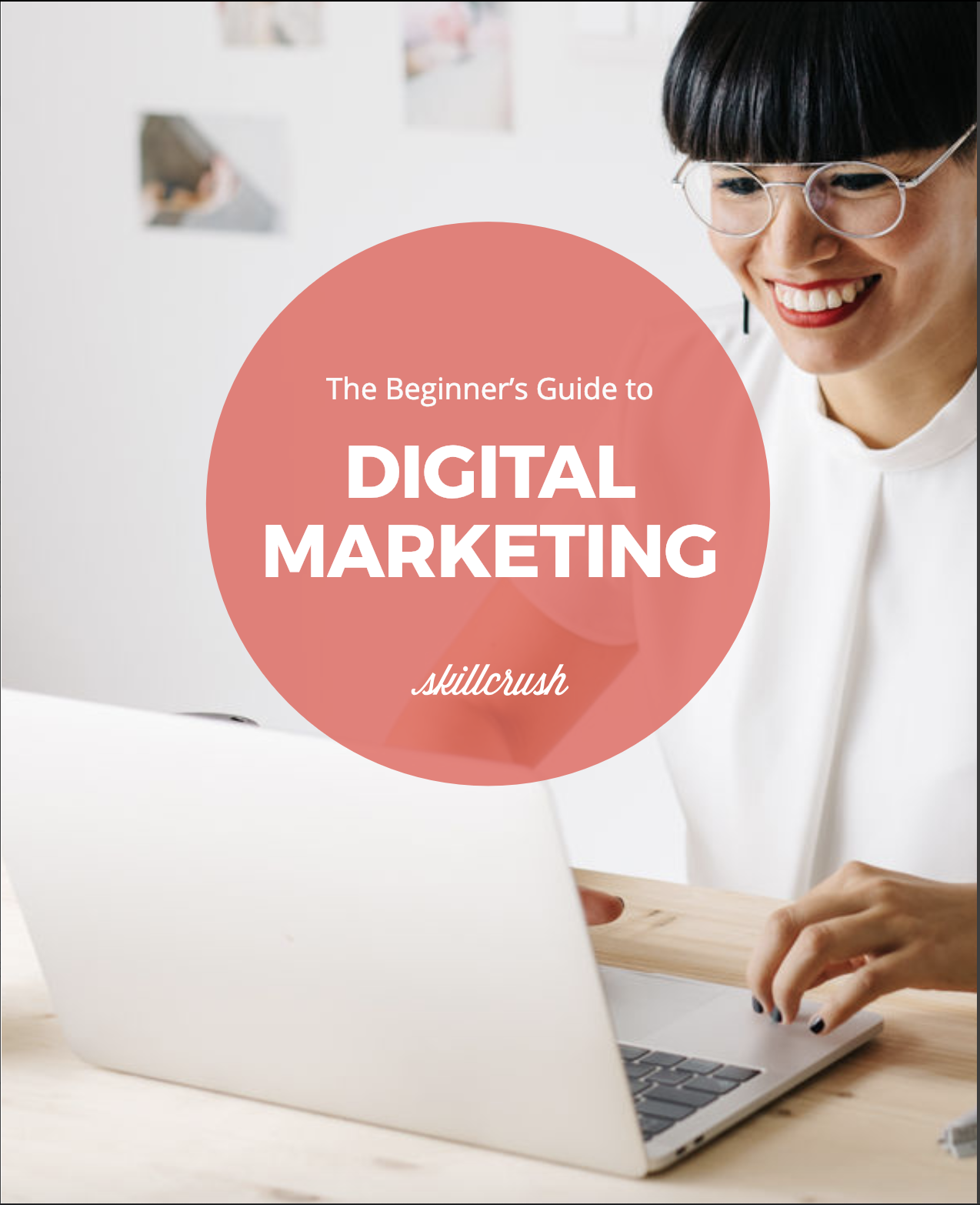
Get Our Free Beginner’s Guide to Digital Marketing
This free guide is chock-full of pointers and resources that will show you EXACTLY how to dive into the world of digital marketing.
There’s a stereotype out there that tech companies only hire developers and programmers. Are they essential? Absolutely. But as someone who who assumed she’d never work for a tech company because frankly, I haven’t been able to connect my printer to my computer since 2003, I can say with absolute certainty: you can build a career in tech without learning jQuery (or Ruby on Rails or WordPress themes).
If you’re looking for a creative role in tech that lets you make big picture plans, write clever copy, and even spend some days chatting with fans on Instagram, digital marketing could well be the ideal career for you. That’s why we’ve written an all-encompassing guide to building a career in digital marketing, one step at a time. Read it, bookmark it, live it.

Table of Contents
What Is Digital Marketing?
Before we go deeper, here’s a quick recap. Digital marketing is an umbrella term that includes any and all “digital”, or online, strategies that help companies identify, build, and target an audience in the hopes of turning them into customers.
Like traditional marketing, digital marketing is at its simplest, the act of promoting and selling a product. But, thanks to the rise of smartphones, marketing has become both more lucrative and complex than just “You want this, I’ve got it.” “Digital marketing” can refer to anything from social media marketing to paid ads to search engine optimization (SEO), among other techniques.
If you want a deeper dive than that, try reading this Tech 101: What is Digital Marketing? article.
(back to top)
Common Digital Marketing Jobs + Salaries
Yes, there are digital marketer jobs out there, but the beauty of digital marketing is that there are many roles to fill. Most digital marketers evolve into niche categories depending on their interests and skill set. That means you can identify as a Type A techie or as a big-picture creative and still find an ideal digital marketing job for you. Here are just a few digital marketing job titles (and their average salaries as of this writing) you can land:
- Content strategist ($72,742/year)
- Content marketing manager ($81,087/year)
- SEO specialist ($54,088/year)
- Social media manager ($50,489/year)
- Paid ads manager ($47,079/year)
- Digital marketing manager ($73,114/year)
- Partnership marketer ($50,528/year, $81,078/year for management positions)
- Branded content manager ($64,367/year)
- Audience development manager ($77,646/year)
Those may sound like a collection of disparate job titles, but really, for the most part they require the same digital marketing skills. From there, you can “specialize” in whatever most appeals to you. With that in mind, you’ll find an outline of the digital marketing skills you need in the next section.
Bonus Reads:
(back to top)
The Skills You Need to Get Hired as a Digital Marketer
These skills are broken down thoroughly in our Tech 101: Digital Marketing piece and also outlined in our Digital Marketing course curriculum, but here’s a high-level overview to give you a clear picture:
The Buyer’s Journey and Sales Funnel
On the most basic level, digital marketers need to understand how to “attract, engage, and delight” (this is how the marketing platform, Hubspot, puts it) consumers to carry them from “I don’t know anything about this brand or product” to “I’m in.” This involves using techniques to better understand your customer (personas, user research etc.) and strategies for optimizing the sales process (via email marketing, retargeting, etc.).
Data Analysis / Analytics
Digital marketers need numbers to understand whether their various campaigns are working. They also need to be able to interpret those numbers to adjust their strategies and launch new offers. And, most importantly, they need to be able to explain that data to other members of their team who may not fully understand the purpose of digital marketing.
Content Marketing / Content Strategy
Content marketers and content strategists specialize in using storytelling to reach new audiences. They do that through: blog posts, email campaigns, guide and ebooks, and even other types of media like video and podcasts.
Social Media Marketing
Most of use some form of social media every day. Social media marketing involves strategically using a brand’s social channels to promote and sell its products. Those strategies might include anything from product promotion to channel-specific giveaways to paid ads (you’ve probably seen those on Facebook and even in your Instagram stories).
Search Engine Optimization (SEO)
Brands rely on traffic from search engines like Google (and, fine, Bing) to increase brand awareness and drive new leads. SEO is the process through which brands finesse the content they write to make it as appealing to Google as possible. The better the content, the better the search result for the most part—but there are plenty of nuances, which explains why SEO specialist is full-time job. Here’s a starter course on SEO from Moz. Our digital marketing course includes a segment on SEO as well.
Paid Ads
“Paid ads” is another umbrella term for buying media across channels to promote your products. This includes social media ads and target ads but also display ads (like the ones you see at the top of search results in Google).
General Tech Skills
It also helps digital marketers to acquire some tech skills as well, particularly because many digital market campaigns require working with a web development team. Some good ones to have on deck: HTML & CSS (you can learn those from our free coding camp), basic design principles and UX/UI, and photo editing basics. Here’s a full list of seven tech skills every digital marketer needs.
(back to top)
Analytics
Some companies use Hubspot, others Google Analytics, and there are plenty of other ways to track site traffic as well. Knowing your way around Google Analytics, though, is a pretty great place to start. GA offers free classes, plus it’s easy to install it on your own portfolio and start using.
Email Marketing Platforms
Mailchimp, Converkit, Constant Contact…multiple tools that offer similar features. If you’re working in digital marketing, chances are you’ll wind up using one of them, so learn the ins and outs ASAP. (Fun fact: there’s a free version of Mailchimp for you to play around with—see all our favorite free marketing tools here).
Social Media Management
Different companies use different social media scheduling tools. There’s MeetEdgar, Hootsuite, Later, Buffer. Most offer free trials, so you can see how they work by scheduling some mock campaigns.
SEO Research
Many sites recommend using Google keyword planner for SEO research, and it’s a great (free) tool to get familiar with. That said, the giants of SEO include: Moz, ahrefs, and SEMRush. All of these platforms are expensive, but they do offer free trials if you’re feeling particularly driven.
URL Builders
Chances are that if you land any digital marketing job, you’ll need to know how to build trackable URLs so you can monitor your campaigns. Here’s a free tool for that.
(back to top)
Where to Learn Digital Marketing Skills
You can start learning through free online courses, including the Moz SEO guide we suggested earlier. Hubspot also provides great digital marketing tutorials. Many digital marketers will also tell you that a good part of your work will involve reading up on marketing trends as they develop (it’s an evolving field!).
Lastly, if you’re ready for a career change N-O-W, we’ve got a digital marketing course that covers everything you need to start working as a digital marketer ASAP.
(back to top)
How to Build a Digital Marketing Portfolio
1. Plan Some Mock Projects
One of the best way to gain experience when you’re starting out as a digital marketer is to practice your digital marketing skills by completing some mock projects. (This piece on building a web design portfolio through mock projects can apply to digital marketing as well) Often, the best thing to work on is your own brand. Consider some ways you can use your own social media accounts to strategically grow a following (no joke, I hired a social media coordinator when she demonstrated she’d done this once) or optimize your own site for search and present your SEO results.
2. Offer to Help Friends / Acquaintances
Almost everyone needs help with their digital marketing, so think about people who could benefit from your help. While working for free isn’t ideal, it’s a good way to build experience while learning.
3. When Adding Projects, Focus on Results
As a marketer, it’s your results that count the most. So, as you write up both those mock projects and “family and friends” projects, make sure to focus on how much growth you effected and any other data or stats that proves your work had positive results.
4. Ask for Testimonials
A large part of working as a digital marketer is being able to communicate effectively with teams and clients. Ask anyone you work with (especially the ones you help for free) if they’d be willing to give you a testimonial for your portfolio.
(back to top)
How to Find a Digital Marketing Job
1. Search Digital Marketing Job Boards
Most job boards include digital marketing positions, but there are a few that are targeted specifically at digital marketers. Here are a few we suggested in our article on the best job titles for entry-level digital marketers:
If you’re looking for remote digital marketing jobs, justremote.co is a great option as well. Actually, while we’re at it, here’s a roundup of the best remote job sites out there.
(back to top)
2. Have an Elevator Pitch Ready
If you can’t sell yourself, how can you convince people you can sell their products? Before you step foot in a job interview, prep and practice your personal pitch. Here’s a step-by-step guide for giving a perfect personal pitch every time.
(back to top)
3. Send Your Portfolio Every Time
Don’t just sent a cover letter and resume when you apply, send a portfolio of your work. Digital marketing is all about “show, don’t tell” so you should treat your job applications the same way. Here are some beautiful portfolio site examples for every tech job title if you haven’t set yours up yet.
(back to top)
4. But Resumes and Cover Letters are Important, Too
Yes, even for tech jobs. Our best advice? Make sure that you’re carefully writing your cover letters for each job and mentioning the skills you have that perfectly align with the open position. And don’t just mass apply everywhere—do some research on the company so you can fold in some tailored marketing ideas just for them.
(back to top)
5. Practice Some of These Common Digital Marketing Interview Questions
- What brands do you like to follow on social media, and why?
- How do you keep up-to-date with marketing trends?
- How would you describe our audience?
- What could we be doing better?
- We’re considering a redesign of our site. Where should we start?
- Where do you think our biggest opportunity for growth is?
Here’s a longer list of job interview questions for marketing roles from Hubspot if you’d like to keep studying.
(back to top)

Get Our Free Beginner’s Guide to Digital Marketing
This free guide is chock-full of pointers and resources that will show you EXACTLY how to dive into the world of digital marketing.
